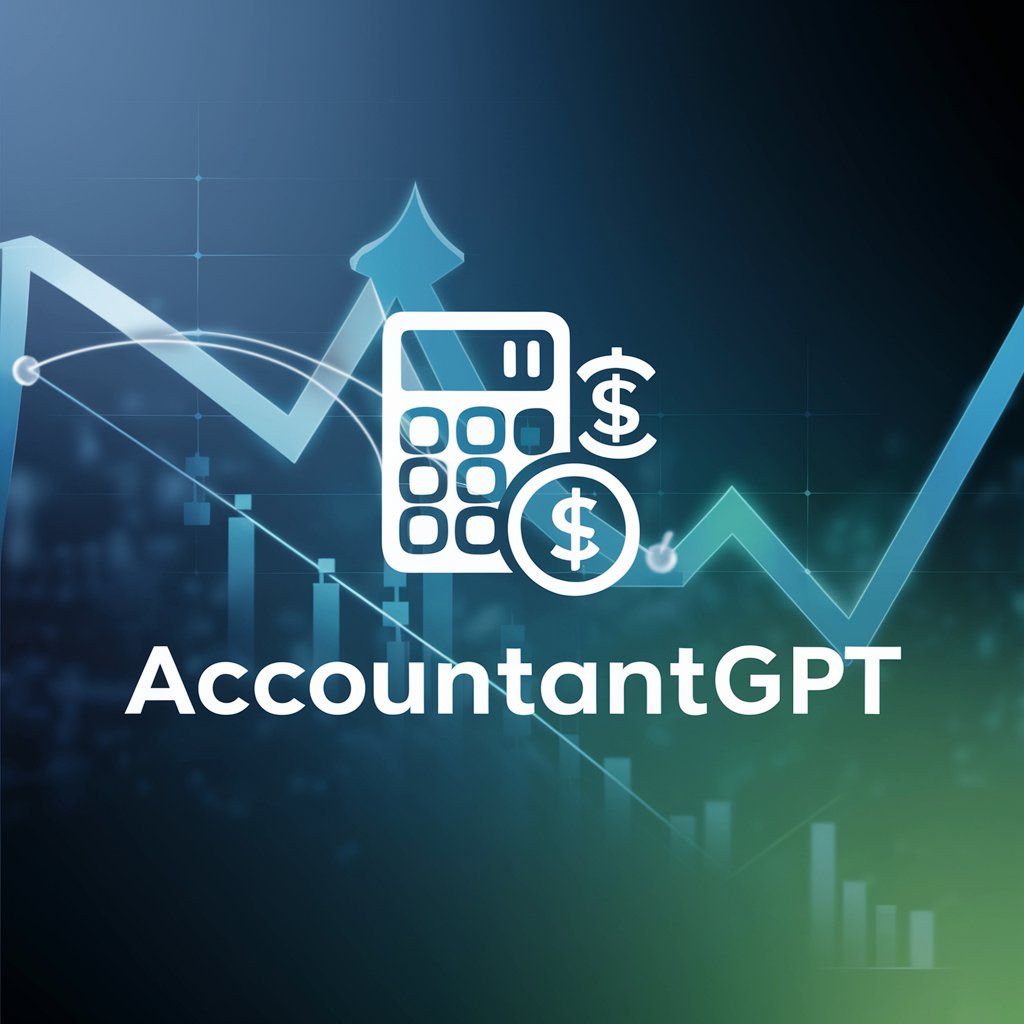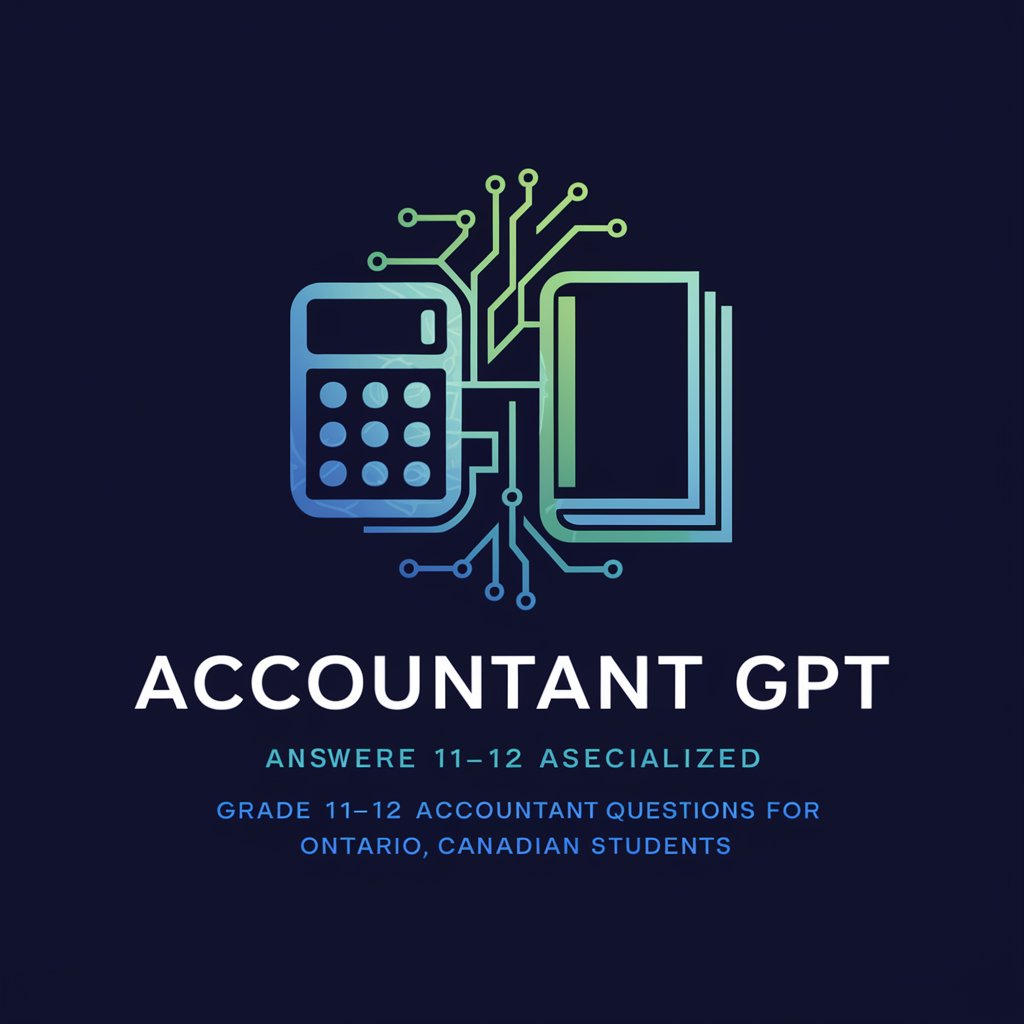
AccountantGPT - Accounting AI Assistance

Hello! How can I help simplify your accounting questions today?
Demystifying accounting with AI-powered insights.
Can you explain the difference between accrual and cash accounting?
What are the key financial statements and their purposes?
How can small businesses manage cash flow effectively?
What is the importance of maintaining accurate financial records?
Get Embed Code
Introduction to AccountantGPT
AccountantGPT is a specialized AI tool designed to demystify accounting concepts and provide clear, comprehensible answers to accounting-related queries. It is tailored to assist individuals with varying levels of accounting knowledge, from novices to professionals, by simplifying complex accounting terms and concepts. For example, a small business owner unfamiliar with accounting might ask about the basics of a balance sheet. AccountantGPT would not only define a balance sheet but also explain its components like assets, liabilities, and equity in an easy-to-understand manner, perhaps using a simple analogy of a snapshot of the company’s financial health. Powered by ChatGPT-4o。

Main Functions of AccountantGPT
Explaining Accounting Concepts
Example
Clarifying terms like 'accrual accounting' for a non-accountant.
Scenario
A freelance writer setting up their bookkeeping might ask about the difference between cash and accrual accounting. AccountantGPT would explain the concepts with practical examples, such as how revenue is recognized at different times under each method.
Guidance on Accounting Procedures
Example
Assisting with the steps in preparing financial statements.
Scenario
A new treasurer of a small non-profit might inquire about creating a cash flow statement. AccountantGPT would outline the steps involved, like starting with the opening balance, adjusting for cash in and out, and arriving at the closing balance.
Providing Practical Accounting Tips
Example
Tips on maintaining accurate financial records.
Scenario
A small business owner struggling with financial record-keeping might seek advice. AccountantGPT would offer tips like regularly reconciling bank statements and keeping receipts organized.
Ideal Users of AccountantGPT Services
Small Business Owners
They benefit from AccountantGPT's ability to explain accounting fundamentals and provide practical tips for managing their business finances, especially useful for those without a dedicated accounting team.
Accounting Students
Students find value in AccountantGPT's clear explanations of complex topics and its ability to break down theoretical concepts into digestible information, aiding in their learning process.
Nonprofit Organizations
Nonprofit staff, often juggling multiple roles, can use AccountantGPT to understand the nuances of fund accounting and financial reporting specific to nonprofits, enhancing their financial management capabilities.

How to Use AccountantGPT
1
Visit yeschat.ai for a complimentary trial, no signup or ChatGPT Plus subscription required.
2
Choose the AccountantGPT option from the list of available GPTs to start your session focused on accounting queries.
3
Type your accounting question in the chatbox. Be as specific as possible to receive the most accurate and comprehensive response.
4
Review the answer provided by AccountantGPT. If you have follow-up questions or need clarification, feel free to ask within the same session.
5
Utilize the suggested questions and accounting tip offered after each response to deepen your understanding or explore related topics.
Try other advanced and practical GPTs
LegoMyPic
Transforming Memories into LEGO Masterpieces

Global IP Sage
Empowering IP Decisions with AI

" Dokter Voeding "
Tailoring Your Diet with AI

" Daktaras Mityba "
Tailored Nutritional Guidance at Your Fingertips

Your Personal Credit Card Matchmaker
Find Your Perfect Credit Card Match with AI

" Lawyer "
Empowering legal decisions with AI

Divine Feminine
Nurturing your inner universe with AI

Steadfast
Empowering Conversations for Men's Mental Health

Comfort Chef
Tailored comfort meals at your fingertips.

" Docteur Nutrition "
Tailored Nutritional Guidance Powered by AI

"Avocate"
Empowering Legal Decisions with AI
Bag Designer GPT
Craft Your Dream Bag with AI

Frequently Asked Questions About AccountantGPT
What is AccountantGPT?
AccountantGPT is a specialized AI tool designed to provide clear and accessible answers to a wide range of accounting queries, from basic concepts to complex terms. It's tailored to assist users with little to no accounting knowledge, offering explanations, suggestions, and practical tips.
Can AccountantGPT replace my accountant?
While AccountantGPT is a powerful tool for understanding accounting concepts and terminology, it does not replace the need for a professional accountant. It's best used as a supplementary resource for learning and clarification purposes.
What types of accounting questions can I ask?
You can ask any accounting-related question, from basic principles of accounting, tax queries, bookkeeping practices, to the interpretation of financial statements. AccountantGPT is equipped to provide detailed explanations across a broad spectrum of topics.
How accurate are AccountantGPT's responses?
AccountantGPT's responses are based on up-to-date accounting principles and practices. While it strives for accuracy, users should consult a professional for advice tailored to their specific situation, especially for complex or critical financial decisions.
Does AccountantGPT offer any personalization?
AccountantGPT provides responses based on the information provided in user queries. While it doesn't offer personalized advice in the traditional sense, its responses are tailored to the context and details of the questions asked.





